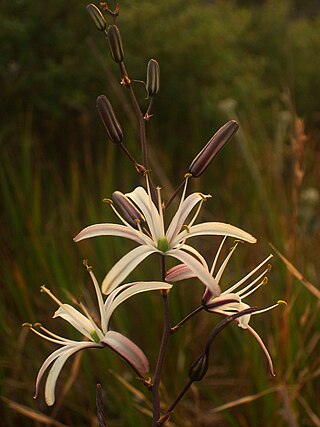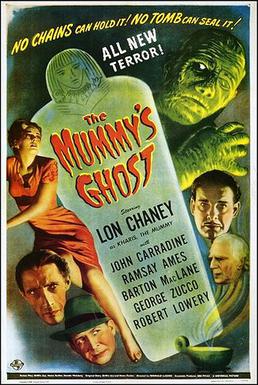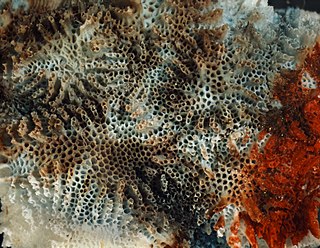
Seven of Nine is a fictional character introduced in the American science fiction television series Star Trek: Voyager. Portrayed by Jeri Ryan, she is a former Borg drone who joins the crew of the Federation starship Voyager. Her full Borg designation was Seven of Nine, Tertiary Adjunct of Unimatrix Zero One. While her birth name became known to her crewmates, after joining the Voyager crew she chose to continue to be called Seven of Nine, though she allowed "Seven" to be used informally.
Species 8472 is a fictional extraterrestrial species in the science fiction television series Star Trek: Voyager. Species 8472 is a designation given to them by the Borg. The multiplayer game Star Trek Online gives their proper name as Undine.

The common names soap plant, soaproot and amole refer to the genus Chlorogalum. They are native to western North America, with some species in Oregon but they are mostly found in California. Common names of the genus and several species derive from their use as soap.

Washingtonia is a genus of palms, native to the southwestern United States and northwest Mexico. Both Washingtonia species are commonly cultivated across the Southern United States, the Middle East, southern Europe, and North Africa, where they have greatly hybridized.

Thelocactus is a genus of flowering plants in the cactus family Cactaceae. Members of the genus are native to the arid lands of Central and Northern Mexico.

The Mummy's Ghost is a 1944 American horror film directed by Reginald Le Borg for Universal. It is the second of three sequels to The Mummy's Hand (1940), following The Mummy's Tomb (1942) and preceding The Mummy's Curse (1944). Lon Chaney Jr. again takes on the role of Kharis the mummy.

Veda Ann Borg was an American film and television actress.

Mesostigmata is an order of mites belonging to the Parasitiformes. They are by far the largest group of Parasitiformes, with over 8,000 species in 130 families. Mesostigmata includes parasitic as well as free-living and predatory forms. They can be recognized by the single pair of spiracles positioned laterally on the body.

Hastingsia alba is a species of flowering plant known by the common names white rushlily and white schoenolirion.
Reginald Le Borg was an Austrian film director. He was born in Vienna, Austria with the surname Groebel and directed 68 films between 1936 and 1974.

The Borg are an alien group that appear as recurring antagonists in the Star Trek fictional universe. The Borg are cybernetic organisms (cyborgs) linked in a hive mind called "The Collective". The Borg co-opt the technology and knowledge of other alien species to the Collective through the process of "assimilation": forcibly transforming individual beings into "drones" by injecting nanoprobes into their bodies and surgically augmenting them with cybernetic components. The Borg's ultimate goal is "achieving perfection".
Hastingsia bracteosa is a rare species of flowering plant in the agave subfamily of the asparagus family known by the common name large-flowered rushlily. It is endemic to Oregon in the United States, where it is limited to a twelve-mile stretch of the Illinois Valley in the southwestern part of the state.

Cancellata is a suborder of bryozoans in the order Cyclostomatida.
Crisia is a genus of bryozoans in the family Crisiidae. Some species are known from the fossil record.
Pseudidmonea is a genus of bryozoans belonging to the monotypic family Pseudidmoneidae.

Nevianipora is a genus of bryozoans belonging to the family Diaperoeciidae.

Hornera is a genus of bryozoans belonging to the family Horneridae.

Lichenopora is a genus of bryozoans belonging to the family Lichenoporidae.

Mecynoecia is a genus of bryozoans belonging to the family Entalophoridae.
Tubulipora is a genus of bryozoans belonging to the family Tubuliporidae.













